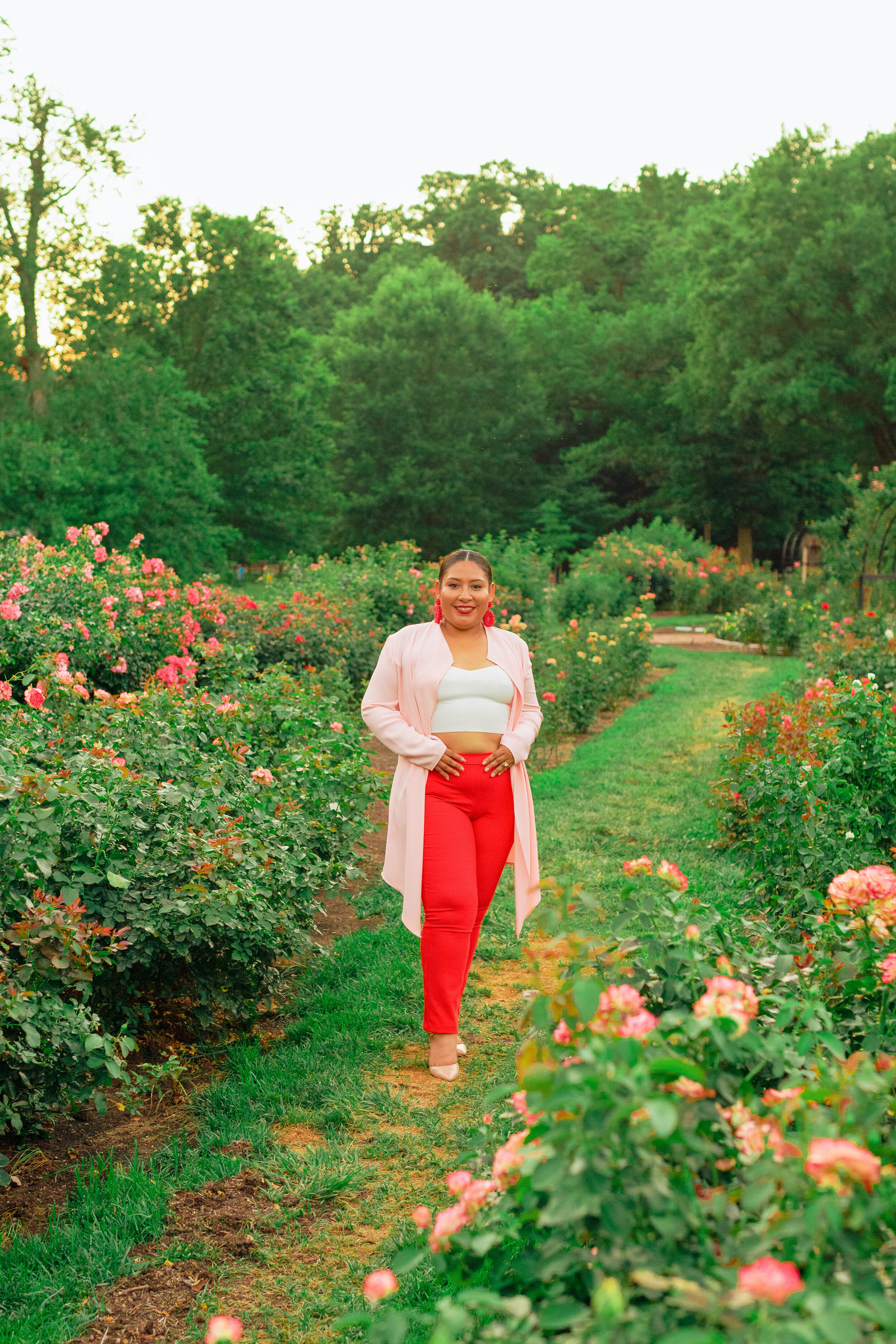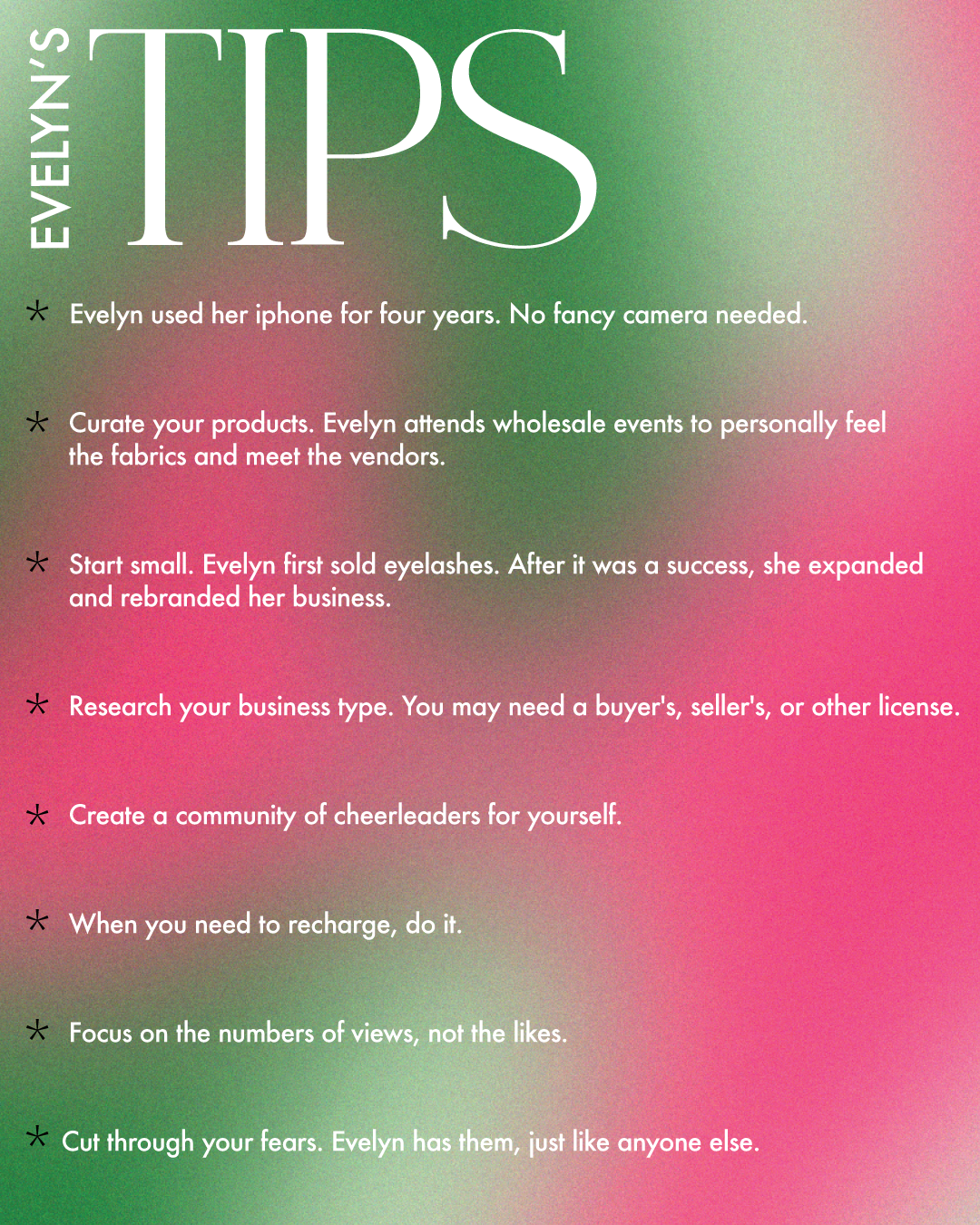ATIY Portrait: Evelyn Vidaurre
Owner, Pretty In Eve
Brought to you by The Quechua Project
Written by Shana Elena Inofuentes
Photographed by Jennifer Albarracin Moya

THIS IS WHAT QUECHUA LOOKS LIKE.
What are the rivers we must cross to get to where we are today? Our past, our present, our future visions; why are we here and where are we going? These are ageless questions, probably hounding us since the dawn of time.
As we set up on the top floor of Evelyn Vidaurre’s Alexandria, Virginia condo, her freshly-set curls glimmer in the sun beaming in from the ceiling window. The concentrated heat, impending interview, and our timeline have us all sweating. Evelyn’s voice is firm, but her dress is soft; long, white layers flowing with every step she takes. As we sit down and take a breath, the real “Eve” flies out. Throwing her head back with mouth wide open, her laugh is like none other, a bursting bubble of joy and freedom: unapologetic, loud, and reveling in itself, and the crew cannot fight its contagiousness.
Evelyn owns Pretty In Eve, an online women’s clothing boutique that she launched in 2019. After working tirelessly on this dream, in 2020 she left her day job to make Pretty In Eve her main one. Many in our “Bolivian DMV” community follow her brand’s Instagram storefront, @prettyineve. We sat down to listen to Evelyn the founder and owner; the wife, daughter, dancer, and inheritor of rich Quechua resilience and joy.
What exactly does she do? How did she start and how does she make it work? How does her Quechua identity shape her, and had she even thought about it? Most importantly, as she digs deep into her inherent power, what can she teach us about ours?
Full disclosure: as with many of us in this community, Eve and I already know each other. In fact, we are friends and have belonged to the same fraternidad for over a decade. Yet, I think that made this interview and creating the whole Atiy highlight on her even more intriguing. Despite countless years and hours of ensayos and organizing in our fraternidad and community, and even just hanging out, I had never once heard these beautiful stories. As I listened to Evelyn’s business joys and pains, about her roots, and even discovered a shared Potosí pueblo (Uncia) in both of our family pasts, I felt astonished that no number of girls’ nights or cultural spaces ever revealed any of this.
I think it is important to ponder how parts of ourselves are often hidden. It is an unfortunate fact that Indigenous culture in the Americas is deliberately erased. Sadly, we can open any book to read about this centuries-long and forceful process. But it is also a fact that we are the products of an immensely rich and fabulous culture that has given us so much, and that has so much to offer the world. If we want this part of us to live on—the worldview, histories, and knowledge systems that make us who we are—we should peel back the covers. In the wake of social justice realities that have recently rocked the world, we can see that people want change. We should no longer be forced to sacrifice who we are in order to “succeed” in life. It is not about going back. It is about moving forward without the baggage. It is about the freedom to be you; uniquely, powerfully, and wholly you.
“It is not about going back. It is about moving forward without the baggage. It is about the freedom to be you; uniquely, powerfully, and wholly you.”
Evelyn the Entrepreneur
Some of Evelyn’s story sounds typical for our community. She lives in Northern Virginia. Most of her roots lie in Potosí, Bolivia, and her Quechua grandparents, like so many of our families, migrated to Argentina. Evelyn was born in Buenos Aires and moved to the U.S. in the third grade. She danced in fraternidades, spent time with her family and community, and went to college, as was expected of her. Many of us can relate to family and community pressure to gain a profession, to choose the “practical path” so that we can somehow, in some way satisfy our migrating ancestors’ hopes of a safe and secure future for us. Evelyn was no different. Her family really wanted her to become a doctor. She tried to want it; she really did, but in her heart she knew that it was just not for her. Still, Evelyn stuck to her dependable job in the dentistry field while avoiding inquiries about dental school in the near future.
In 2019, Evelyn made a decision that changed it all. While sitting on a plane, her childhood sweetheart, Job “Jota” Senzano, turned to her and asked the big question. No, not the “will-you-marry-me” one. (They were actually flying back from their wedding in Argentina!) It was the other one, the one that nags, whispers, and occasionally shouts at us: if money were not an obstacle, what is the one thing you would want to do with your life? Who do you want to be?
“If money were not an obstacle, what is the one thing you would want to do with your life?”
“A business owner,” she told him, creating a shop for women. When relaying this story to us, it sounded like Evelyn, deep inside, had always known this answer. It was like a jack-in-the-box, tightly wound and just waiting for that moment, or that special someone who would allow, or dare her to be true to herself, to open the top and let this jump out. Evelyn’s proverbial train had left the station, and it was not going back. Jota and Evelyn started Pretty In Eve.
“My mom was always pushing me to be a boss...now that I think about it.” Evelyn credits both her parents with instilling in her a sense of confidence. Her mother encouraged all of her childhood business ideas, from babysitting to baking, but she did so with a large dose of honesty. “You can do it,” she would tell Evelyn, but warned her that she would have to work hard.
Evelyn forges spaces. In everything she does, you can see her pushing, bending, and breaking past the types of roles society often presupposes for women like her, women like us. Evelyn says that her intention with Pretty In Eve is to create a space for women to find clothing and accessories for moments of joy for themselves. Her home computer station is like a microcosm of that, a mini space that she has carved out with personalized inspirational material. She turned her home’s second bedroom into a closet. When you walk into it, you can sense the deliberateness with which she built its experience, a place for herself. We are often raised to give, to make space and care for others, at the expense of ourselves. Caretaking, cooking, cleaning for all; we are familiar with the expectations. That room exudes something different. It says, “instead, I’m going to give to me.” Even in her huge, boisterous laugh, not shy and shrinking as is often expected of us, I see a self-respecting demand for the space one deserves. This theme swims all around her.
Where does she see herself in 10 years? Running a business big enough to give other people opportunities. Ayni is a practice of reciprocity deeply ingrained in our upbringing and community. Many of us do not know that we have a word for it, but we all live it. It drives so much of how our community is structured, like our constant kermesses and the reciprocal customs between fraternidades and comparsas. (Ask your older family members what Ayni means to them!) This custom’s theme surfaced a lot in our discussion with Evelyn. In the upcoming video that we will publish, you will get to hear more about it. In the meantime, we share Evelyn’s future vision as one of Ayni’s many iterations in her business and personal life.
Evelyn’s Potosi, Quechua, and Our Many Rivers
Evelyn’s closest family ties run deep in the tiny, rural town of Vichacla in the south of Potosí. She vividly remembers as a child sitting on her father’s shoulders as he and their family crossed its rushing river by foot, and her grandfather always noting, “one day, this river is going to take us.” That river was a challenge, fluctuating and unpredictable, but they had to cross it to get from their community to town, so they faced it, time and time again.
Evelyn’s grandparents made a momentous decision that would change their descendants’ lives: they migrated from their ancestral home in search of a more secure future. When they moved to northern Argentina, they worked in agriculture. After some time, they made their way to Buenos Aires. At first in the big capital, Evelyn’s grandmother sold fruit, because it was what she knew. Soon, she noticed that in their part of the city, far from the more affluent downtown, there lacked clothing stores, so she started selling clothes. Since those small beginnings, Evelyn’s grandmother’s clothing shop has grown tremendously.
Evelyn reflects on her Quechua-speaking grandmother. “What’s fascinating about my grandma is that…she doesn’t write Spanish, she doesn’t read Spanish, but she knows math...with the knowledge that she had, she was able to still build her own little business.” Does this inspire Evelyn? “How can it not?” she confidently replies. “It definitely inspires me.”
“What’s fascinating about my grandma is that…she doesn’t write Spanish, she doesn’t read Spanish, but she knows math...with the knowledge that she had, she was able to still build her own little business.”
Growing up, Evelyn recalls how people from her grandparents’ pueblo would show up to her grandfather’s house in Buenos Aires on his birthday, thanking him for the help he had given them when they first arrived in Argentina. When she spoke of it, you could envision the chain of helping hands stretching across space and time back to little, green Vichacla.
Evelyn’s most vivid memory of Vichacla is of going there for Carnavales when she was five years old. Buenos Aires, where Evelyn was born and raised, is a very cosmopolitan and industrialized capital, so everything on this first trip to Vichacla felt eye-opening. The river was the place to bathe and they were self-subsistent for food, living off their chacras. And, of course, there was all the Quechua; only Quechua. Seared in her mind is the view from the top of the church, where she sat with her grandfather watching the various communities’ Carnavales comparsas converge in the town to dance in loud circles. He showed her how the communities gathered from the four corners and she marveled at their judgeless competition, “how something so small can make somebody feel so big.”
Like many of us who are able to do so, Evelyn’s grandparents try to return home annually for Carnavales. This special season, full of harvest ritual, thanking, and giving back for all we have, is an important time for us. In the case of Evelyn’s grandparents, they and their community put a lot of pride and work into planning their Carnavales songs. It is a big deal.
Today, after all those years and dicey crossings, that river in Vichacla has a bridge. It was important to Evelyn’s grandfather to give back to his community in this way.
We all face these rivers, these fears and challenges. We all must make our choices, dig deep, and help each other to get across. No matter how modern our hustles seem to get, we can hear echoes of our past. They push us, time and time again, and give us the strength to keep heading where we know we want to be.





